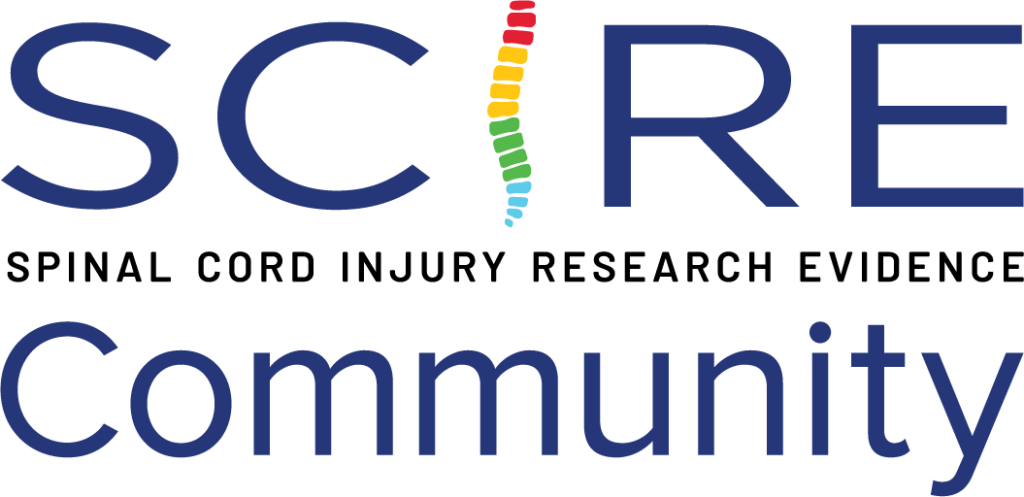Author: The SCIRE Professional Team | Reviewers: Cynthia Morin, Andrea Townson | Published: 5 August 2020 | Updated: ~
People living with spinal cord injuries (SCI) have a greater risk of developing more serious symptoms of COVID-19. It is critical for caregivers and attendant services to take the necessary precautions and preventive actions outlined in this document in order to minimize the risk of transmission.
Wash hands often
- Use soap and water to wash hands for 30 seconds before and after contact with your client.
- Use a hand sanitizer (with at least 70% alcohol) if soap/water are not available.
Clean and disinfect
- Clean frequently touched surfaces in client’s home (e.g. doorknobs, light switches, counters, cabinets, phones, remote controls, handles on toilets and faucets) once every few days using soapy water to wipe away debris/dirt.
- After cleaning, use only disinfectants (e.g., Clorox, Lysol, Microban) that have a Drug Identification Number (DIN) and have been approved by Health Canada for use against COVID-19 in Canada/your country’s standards.
- For clients who use mobility aids or other equipment, regularly clean the: wheelchair joystick, armrest, wheel rims, mechanical lift controller and other frequently used surfaces.
- If approved disinfectants are not available, a diluted bleach solution can be prepared for household disinfection in accordance with the instructions on the label, or follow instructions for proper handling of household (chlorine) bleach.
- Place contaminated laundry (including non-medical cloth masks), into a container with plastic liner.
- wash using regular laundry detergent and hot water (60-90°C)
- wear gloves when handling laundry
- clean hands with soap and water for 30 seconds immediately after removing gloves
Protective equipment
- If your caregiving role requires the need to be within 2 metres (6 feet) to assist with daily tasks (ex. Bathing, brushing teeth, dressing) wear personal protective equipment such as: a medical mask, disposable gloves, and eye protection.
- Do not re-use medical masks or gloves. However, under extreme supply limitations, masks may be re-used if not visibly damaged, contaminated, or wet.
- If a mask is re-used, prevent contamination by storing it in a clean paper/plastic bag, or cleanable container with a lid (discard bags after each use)
- Healthcare practitioners have been instructed to use 1 mask/day (put on when entering facility/home and removed when eating or leaving facility/home at end of shift)
- Place used medical masks, gloves, and other contaminated items in a lined container, secure the contents and dispose of them with other household waste.
- Take gloves off first, wash hands, then remove mask
- Clean your hands again with soap/water/hand sanitizer before touching your face/other surfaces
Caregivers should create a back-up care plan for clients
- Decide who can step in if you are unable to provide care for your client.
- Consider the specialized tasks you manage for people with SCI and expand your circle of care to include a person with SCI’s family members or friends who may be able to help if necessary.
- Use video platforms (Facetime, Skype, Zoom) to review the plan with your circle and recipient to ensure they are comfortable with the backup-plan.
The care plan should include the following:
- Contact information for: doctors, clinics, pharmacy, family, friends, neighbours, home and community care case managers, and food delivery.
- Information regarding the client’s condition (medical history, allergies, specific needs etc.).
- A schedule of what your typical tasks look like with enough detail for someone to follow and take over if need be.
- A list of names and doses of medications and when they are given to the recipient.
- A list of important supplies that need to be purchased regularly (e.g., toilet paper, cleaning supplies, hygiene products).
- Information about their likes and dislikes, self-care routines, and food preferences.
- Additional non-perishable food items to ensure your client has continued access to healthy meals.
- A list of essential items your client needs if they need to leave their home or require hospitalization.
A podcast created by caregivers of BC who share their experiences, “highlighting the joys, trials, and self-discoveries that come along with this rewarding and taxing position”: Caregiving Out Loud Podcast
Advice provided from the Government of Canada for Caregivers in caring for a person with COVID-19 at home
Tip sheet created by the Ontario Caregiver Organization. Provides resources/education on improving caregiver mental health during COVID-19.: Tips for Caregivers Mental Health During COVID-19
The Family Caregivers of BC provide multiple tips and resources for caregivers to practice self-care.: Self-Care Tips During Uncertain Times
Coronavirus Disease 2019 (COVID-19) Fact Sheet. (2020, March 4). Retrieved from: (https://shepherd.org/docs/Coronavirus2019_FactSheet_3.4.20.pdf
Public Health Ontario (2020, February 14). Coronavirus Disease 2019 (COVID-19) Self-isolation: Guide for caregivers, household members and close contacts. Retrieved from: https://publichealthontario.ca/-/media/documents/ncov/factsheet-covid-19-guide-isolation-caregivers.pdf?la=en
Public Health Agency of Canada (2020, May 1). How to care for a person with COVID-19 at home: Advice for caregivers. Retrieved from: https://canada.ca/en/public-health/services/publications/diseases-conditions/how-to-care-for-person-with-covid-19-at-home-advice-for-caregivers.html
Public Health Ontario (2020, April 10). Coronavirus Disease 2019 (COVID-19) When and How to Wear a Mask Recommendations for the General Public. Retrieved from: https://www.publichealthontario.ca/-/media/documents/ncov/factsheet/factsheet-covid-19-how-to-wear-mask.pdf?la=en
The Ontario Caregiver Foundation (2020, March 31). COVID-19 – Do you have a plan? Retrieved from: https://ontariocaregiver.ca/wp-content/uploads/2020/03/Ontario-Caregiver-Organization-Caregiver-Contingency-Plan.pdf
Family Caregivers of British Columbia (2020, March 11). COVID-19. Retrieved from: https://familycaregiversbc.ca/community-resources/covid-19-virus/
Image credits
- Hand Washing ©AnnaliseArt, Pixabay
- Cleaning Supplies ©MarCuesBo, Pixabay
- Protective Equipment ©artpolka Pixabay
- Checklist©OpenClipart-Vectors, Pixabay





